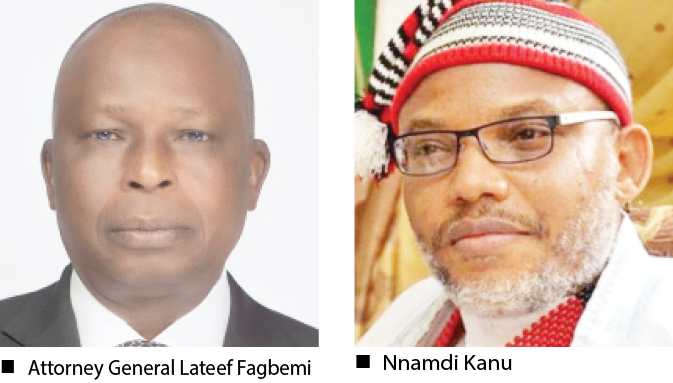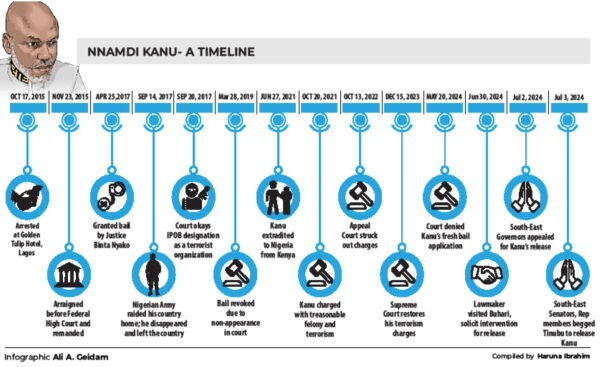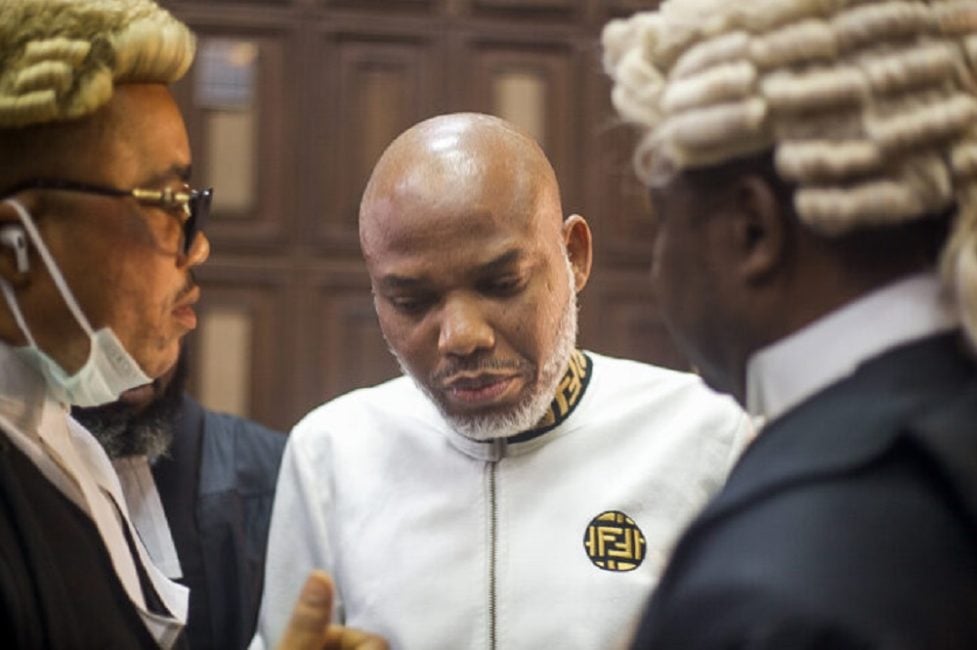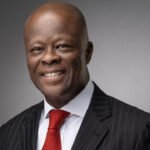Pressure is being intensified on President Bola Ahmed Tinubu’s administration to release Nnamdi Kanu, the leader of the proscribed Indigenous People of Biafra (IPOB), the separatist group, who has been in the custody of the federal government since June 2021.
Sources within the government indicated that Kanu may be released soon. However, the sources did not indicate the terms under which he would be released.
The presidency officially refused to comment on the development when contacted last night. However, sources in the presidency told one of our reporters that what cannot be denied is that the leaders from the South East geopolitical zone have the right to ask for the intervention of the president on the matter.
Political leaders from the South-East geopolitical zone have intensified lobbying to secure the release of Kanu in the last few weeks, with several meetings and open appeals to the government.
The pressure from the zonal leaders, which has transcended political party affiliation, has also seen both the legislators and chief executives of the five states of the region unite in seeking a political solution to the impasse, which has led to economic and social crisis in the zone.
The situation also cost hundreds of lives since IPOB declared a sit-at-home order on Mondays across the zone, which was being enforced by its paramilitary wing, the Eastern Security Network (ESN).

While the federal government, through the office of the Attorney General of the Federation (AGF) and Minister of Justice refused to divulge the plans of the government on the matter, stating that commenting on it would be subjudice, Daily Trust gathered that the governors of the five states would be meeting the president any moment soon, to formally present their resolution to him.
It will be recalled that at the end of their meeting on July 2, which had in attendance Governors Hope Uzodinma of Imo, Alex Otti of Abia, Chukwuma Soludo of Anambra, and Francis Nwifuru of Ebonyi, as well as the host, Governor Peter Mbah of Enugu State, the governors “resolved to interface with the federal government to secure the release of Mr. Nnamdi Kanu.”
A day after the Enugu meeting, senators from the region under the aegis of the South East Caucus of the Senate met with the AGF, at the end of which it was revealed by their leader, Senator Enyinnaya Abaribe, that aside from making a plea for the release of the separatist leader, the Caucus also submitted a passionate letter to President Tinubu to intervene in the release of Kanu.
According to the senators, unless Kanu is released, social and economic activities in the South- East zone would continue to crumble.
Abaribe, who spoke to newsmen on behalf of his colleagues, lamented that economic and social life in the South- East have suffered enough due to the continued detention of the Biafra nation agitator.
He noted with concern that the peaceful demand of Kanu had been hijacked by hoodlums and hardened criminals, leading to the wanton killings of innocent people, including security operatives.
The former deputy governor of Abia State and one-time surety of Kanu in 2017, said he had already met him (Kanu) at the headquarters of the Department of State Services (DSS), in Abuja, on July 1, and he agreed to abide by any conditional release.
Senator Abaribe expressed optimism that once Kanu was released, the tension and acrimony engulfing the South-East zone since 2021, when he had been in DSS custody, will become a thing of the past.
On the same day, the South-East Caucus in the House of Representatives also announced their support for Kanu’s release.
The caucus made the call in a statement signed by 43 lawmakers spread across the five states of the zone, including the Deputy Speaker, Benjamin Okezie Kalu (Abia); the Deputy Minority Whip, George Ozodinobi (Anambra); the leader of the caucus, Enwo Igariwey (Ebonyi); the Deputy Leader of the caucus, Nnolim Nnaji (Enugu); and the Secretary of the caucus, Miriam Onuoha (Imo).
The caucus said that a political solution remained one of the quickest ways of bringing an end to the matter and, in turn, restoring peace in the South-East region.
It will also be recalled that a few days earlier, Obi Aguocha, the lawmaker representing Ikwuano/Umuahia North/Umuahia South Federal Constituency, Abia State, where Kanu hails from, visited former President Muhammadu Buhari at his Daura country home, to seek his intervention in the moves to secure the release of the separatist leader through political channels.
Kanu, who was arrested and brought back to Nigeria from Kenya in July 2021 while Buhari was in charge of the country’s affairs, has been in detention since fleeing the country following a military raid on his home. He faces multiple charges, including treason.
Aguocha emphasised the potential of a political resolution to address grievances and foster unity within Nigeria, promising Kanu’s readiness to contribute positively towards national unity and development.
Before the visit to Daura, Aguocha had led 50 members of the House of Representatives in appealing to President Tinubu to direct the Attorney General and Minister of Justice, Lateef Fegbemi (SAN), to explore legal pathways under the constitution and relevant laws to achieve Kanu’s release.

AGF mum
Meanwhile, when contacted on the development, Kamardeen Ogundele, the media adviser to the AGF, said it would be “subjudice for the government, especially the AGF, who is the chief law officer of the nation, to comment on the matter “because it is still before the court”.
FG’s option after political agreement is Nolle Prosequi – Yadudu
Speaking on the options before the government, renowned constitutional lawyer, Professor Auwalu Yadudu told Daily Trust that if the government could extract commitment from the South-East elders and leaders, it would not be an issue for the government to enter a ‘nolle prosequi’—the discontinuation of the trial.
The former legal adviser to late Head of State, General Sani Abacha, explained that “that is the only option, and under the Constitution, the AGF has the power to discontinue all further proceedings.
“But, of course, the elephant in the room really is whether there is sufficient goodwill and commitment on the part of all stakeholders to make good on pledges, so that the government can say that when they enter the nolle prosequi, things can come to some conclusion.
“Obviously, the appearance by the attorney general to discontinue further proceedings does not mean that the party, the beneficiary, is discharged, acquitted, and relieved of all responsibilities for what is being alleged against him. The attorney general can resume or bring further fresh actions against them if they do not make good on the undertaking they make,” he said.
On why bail may not be an option to resolve the impasse, Prof. Yadudu, said, “The bail application really is not a reconciliatory route on both sides. First of all, Kanu has obtained bail in the past, during the previous regime, and he has jumped that bail, so I don’t think it is the best route for both of them.
“If you want to find a reconciliatory way to end matters, I think engaging in political discussions, getting commitments from all sides, and concretizing that through the appearance to discontinue would be the best option, but if they grant him bail, I think the young man will still jump it, and then we will go back to square one.
“I only hope the governors and those who are pushing for him, especially the elders, will mean business, and they will also be able to deliver on their own side, because in the past, that’s what happened after they collaborated (to secure his bail) with him, and still now we are back to square one”, the professor said.
Also commenting, Professor Seyi Akinseye-George (SAN), said the out-of-court settlement would require a political decision by authorities as the matter was still pending in court.
He, however, added that “there must be clear conditions, which, if violated again, could lead to re-arrest.”
“I believe the man himself; he has learned some lessons on how to go about the agitation. I support calls for devolution of government in Nigeria, but the country’s unity and diversity, with over 200 million people, is a good thing,” he said.
Similarly, Barrister Chukwudi Igwe said there is a legal leeway that could be exercised by the President through the Attorney General of the Federation and Minister of Justice, whom he has delegated such powers to.
“It can even be done by a letter to the court under the Administration of Criminal Justice Act (ACJA) that the charge be withdrawn and the prosecution terminated, and this would validly withdraw the charges against Nnamdi Kanu,” he said.
By Clement A. Oloyede, Muideen Olaniyi & John C. Azu

 Join Daily Trust WhatsApp Community For Quick Access To News and Happenings Around You.
Join Daily Trust WhatsApp Community For Quick Access To News and Happenings Around You.


